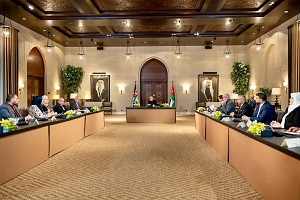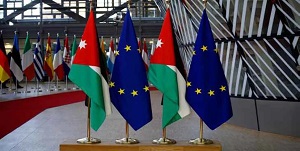
Wendy Merdian, Jo
Our car wound through the narrowing alleyways of a rundown neighborhood outside Amman. Quotidian details of street football and swaying laundry framed our ascent and belied the activity inside the nondescript apartment building I, a photographer, and two translators were headed toward. The casual posture of the man by the entrance was offset by his watchful eyes, alert for any danger. He guarded a group of eight Arab women, all of them sex workers who had gathered to talk about the issues in their lives and occupation.
Conventional wisdom puts the nationalities of prostitutes in Jordan solidly in the tall, blond, Northern-origin and the short, East Asian-origin categories. These women ranged from eighteen to forty years old. Six were Iraqi and two Jordanian. Contrary to the stereotype of prostitutes, all but one is married, and with one exception all dressed in conservative hijabs; they could have been our neighbors. It was in their eyes where all that was not right reflected in fear, suspicion, or glazed disengagement. Their body language displayed similar ambivalence, but as they decided to trust, they leaned into us in unison, eagerly taking the chance.
As stories poured out, common threads emerged: the primary, that not one of them chose this lifestyle. It was a last resort in a life without options; often it was about the literal survival of their children. They were forced to make sexual choices that stood squarely in opposition to deeply rooted cultural values, making them not choices at all, but compulsions.
Regionally, violence against women has been covered extensively but the plight of prostitutes is rarely part of the conversation. Because prostitutes in Jordan are almost never fully willing participants, the experience becomes a type of sexual trauma. And because sexual purity is the baseline for both a woman’s and her family’s honor, being forced into the sex trade can become a slow death sentence.
Amal, founder and director of the Good News Center is a tall, elegant woman from a Bedouin family, but who grew up in Amman. Making her all the more intriguing, she’s single and has the unqualified support of her family. Her upbringing led to a love for social activism and crystallized in advocacy for family health.
She was planning a wellness program for orphaned children for the Department of Health when she stumbled upon evidence of a sex economy fueled by local women and funded by local men. She changed projects and in 2006 founded the Good News Center, which has no religious affiliation. The apartment building that houses the center has become these women’s daytime refuge where they get help on their terms, without judgment, from other women and are offered employment alternatives. For hers and the center’s protection Amal, chose this pseudonym for the article, deliberately adopting the Arabic word for “hope.”
Most of the women wistfully describe happy childhoods, although physical and psychological violence were part of them. All eight at some point experienced the tragedy of war, death, or divorce. The already fragile fabric of their lives was ripped, their safety nets shredded. The only asset they had left was themselves, and then came the stark realization that their bodies were a commodity to exchange for survival. At the same time, others watched.
These people keep an eye out for young women at risk. They surveil Iraqi refugee families and Jordanians fleeing abuse. They stake out orphanages, waiting for girls to turn eighteen, bringing them into what may be the first family they’ve known and creating a complex sense of community that keeps them enmeshed. The grooming begins sometimes with nothing more than a JD20 “gift” and soothing words that hook hungry hearts. These aren’t the pimps portrayed in Hollywood, covered in bling, but men modest in appearance and women offering protection and a community.
Du’a, also a pseudonym, is a soft-spoken, hauntingly beautiful twenty-year-old. Born to a Jordanian father and an Iraqi mother, she and her three younger sisters shared an idyllic childhood in Iraq. Her world collapsed when her father died and her family moved back to Jordan, where her father’s family shunned them. After her mother remarried to support her daughters, her new husband resented the girls. “He would complain about having to feed us at every meal, even the cost of the rice,” Du’a said. She was just a teenager when she met her neighborhood’s watchers, young women who lived away from their families. They offered her a place to live so she packed a bag and left without saying goodbye.
On her own, she could barely earn a living, and her roommates told her she could make good money as a nightclub waitress, like them. Vulnerability meets opportunity in areas such as the North Gate of University of Jordan, Jubayha and Luna parks, and various nightclubs, where owners take commissions from the women who work there. Curious, Du’a went. A man offered her JD20 for twenty minutes of his sexual act of choice. She was shocked when she realized what was expected of her, but for a dinar per minute she thought she could endure just about anything. With an average Jordanian female teen’s understanding of sex, she had no clue what it all meant until her virginity was gone. Shame drained her self-worth, leaving her emotionally numb. She couldn’t go back to her stepfather, mother, and sisters—this is the stuff so-called honor crimes are made of.
Then a potential savior appeared. “I met a wealthy businessman at the club,” Du’a said. “He liked me, and he wanted to get me out of the bar. He said he wanted to marry me. He rented us an apartment, and every time he came back from traveling, we would be together.” As Du’a spoke, the memory of that hopeful time briefly brightened her eyes. “But then I got pregnant. He made me get an abortion. I got pregnant again, and he made me do it again.” Du’a faltered, her voice cracking as she said, “It was very hard.” The mandated abortions proved that hers was just a misyar marriage—a type of marriage mostly just to make sex halal. She was unworthy of carrying his children.
“There are a number of factors that make women vulnerable to sexual exploitation; usually it takes a combination to send people over the edge. Poverty, gender discrimination, and racism are probably at the top of the list globally,” said Jennifer Roemhildt Tunehag, a consultant on prostitution and trafficking issues, specifically with refugees, and founder of Nea Zoi in Athens. “But abuse or a dysfunctional family of origin have often set the stage by tearing down an individual’s boundaries and self-esteem.” Perhaps the greatest factor at work in a male-dominated society is the perception that men cannot control their lust, and that they are entitled to have all their perceived sexual needs met immediately no matter how socially illegitimate it makes the person who fulfills them.
For prostitutes with no protection, customers often won’t pay, will beat them, or will demand more than the agreed upon act, turning sex for money into outright rape. With an hourly wage much higher than even a university-educated woman could attain, many prostitutes are content to risk harm.
According to Amal, in addition to other women we spoke to, there are other, “luckier” women working in prostitution rings based out of apartments-turned-brothels around Amman, where the furnishings include timers by the quarter-hour, cash registers, and armed guards. The less lucky are the prostitutes who have sex with construction workers in the cement-block structures near building sites.
For one of the Iraqi women, it was her own husband who got her into prostitution. From the beginning he plied her with drugs and alcohol so she would dance seductively for his friends. He wore her down to get her used to the idea of sharing her body with other men. He showed her pornography to teach her what he wanted her to do. And then he pimped her to his friends.
For a time, the work gave her sexual and financial confidence. With sex providing a substitute for the intimacy her husband never provided, she solicited strangers on the street while her unemployed husband profited. Later those choices, made of her own volition, exposed the degradation she’d suffered.
The meeting during our interview was the first time she had come to the center. She insisted on dancing for our group, displaying a childlike compulsion for validation by using the only skill she felt she had. It can only be described as a form of pole-dancing, against a wall.
Du’a’s husband stopped sending her money and all contact after the abortions. Feeling abandoned, she returned to prostitution. One day, her brother-in-law came around with a friend. “I thought it was to bring me money from my husband,” said Du’a. Instead, he offered her JD60 to have sex with them at the same time. Through her tears, and ours, all we could understand was that she escaped them by climbing out a window.
Out of money again, Du’a went out. In Jubayha Park, by chance her stepfather saw her and began shouting that she had shamed him by running away. She managed to evade him and a woman helped her maneuver through the crowd and police, offering her a number. This was Um Rakan, a different kind of watcher, offering a different kind of protection.
Um Rakan, a married mother of eight, had made a good living selling cosmetics to her neighbors. Even then she also had radar for at-risk women, reading the numb expressions and shame in their eyes. When she came by, Um Rakan began to ask questions others hadn’t bothered with and she, too, accidentally discovered Jordan’s sex industry.
Her discovery led her to a new career with Amal at the Good News Center. Um Rakan pretends to be a madam, gains access to the women, gives out her phone number, and waits for them to call.
It’s dangerous work. Pimps and madams don’t want to lose their workers and threaten those who help them. They’ve planted drugs on women who attend programs, then called the police. One asked the center for reimbursement for the profits lost when women attend classes on violence or health protection. Amal said authorities have not shown interest in intervening. Sex is considered a private matter, and domestic violence is only now being spoken of as a problem—prostitutes are certainly not a concern.
In spite of the danger, the results are worth it. “I am addicted to my work,” said Amal, exuding quiet confidence.
The centers’ success is based on offering sexual health classes and free HIV testing, with more than fifty prostitutes having completed the courses. Most of the sex workers never finished school, much less learned how their bodies work. Learning this and the dangers of sexually transmitted diseases, they begin to insist on using condoms. The center empowers them to dictate the terms of access to their bodies for the first time, which helps break a cycle of sexual violence. The problems for Amal were acquiring continuous funding and helping the women find alternative employment that didn’t require years of schooling.
Amal found an ally in International Relief and Development. IRD is a nonprofit, nongovernmental organization responsible for implementing US State Department, UNHCR, USAID, and privately funded programs worldwide. Amal was described by an IRD official as “a psycho-social expert,” saying, “She is intelligent and passionate, tirelessly looking for the most vulnerable and how to serve them in the best way possible.”
Amal said, surprisingly, that their work has gained the support of both religious and community leaders of the area. They recognize prostitution is happening, and know they need to deal practically with the reality.
Amal has succeeded in creating a community bond of respect, agreed the women. “Amal has listened to us, provided courses for new jobs for us, provided leadership for us. We are a family,” said one woman. That connection and support is critical to preventing a woman’s return to sex work.
“It can be extremely difficult for people to embrace and maintain a lifestyle outside of prostitution unless these other factors are acknowledged and addressed,” Tunehag said. “In fact, the rate of recidivism for people leaving prostitution is grim. Most commonly, a rate of eighty percent is quoted, while specific locations, programs, and circumstances may skew this from two-thirds to nearly ninety percent.”
Amal said simply, “Some we never see again. But we keep moving forward. We keep watching.”
Du’a enjoys her new trade as a hairdresser that she learned at the center, which provides “graduates” a kit so they can go to women’s homes and do their hair. Out in the community, she will also be on the lookout for women who were in the same place she was. She already brought the women from her former apartment to the center. The watched has become a watcher.
The center’s staff will be watching the wall dancer. Her first visit to the center came just in time. Her ten-year-old daughter had recently posed a question and demand: “Mama, why do you do that? Please stop.” Her daughter put the validation from the only skill she believed she had at odds with the value of her worth as a mother to her children. It resonated with her, filled her with both guilt and hope, and gave her the strength to pursue another way. She has many obstacles before her, including the man she married. The reasons for becoming a prostitute are never simple. The ways out are never easy.




